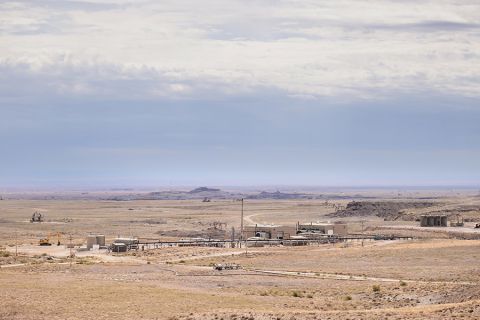Nigeria is addressing five barriers to improve gas production and processing: pricing, fiscal terms, institutional and infrastructural arrangements, legal and regulatory framework and financing. This is according to Funsho Kupolokun, group managing director and chief executive of the Nigerian National Petroleum Corp. (NNPC), who spoke at Rice University's James A. Baker Institute recently. NNPC plans a four-pronged response: a natural gas policy that promotes a public-private partnership for orderly and rapid commercialization of gas reserves, the new Downstream Gas Act that will ease regulatory and policy constraints, fiscal reform that ensures Nigeria receives a fair share of the economic rent generated by production, and the Gas Master Plan, which includes central processing facilities, an integrated pipeline network, a uniform pricing mechanism, standardized gas specifications and reserves growth. Changes in the nation's policy reflect the growing need to rapidly expand the gas infrastructure, he said. Chief among these is the industry's desire to encourage more competition between public and private producers, and as such the NNPC is no longer at the center of the energy ministry in Nigeria as more independent companies are allowed access to production sites. "We're building a new gas structure out of the old oil industry," Kupolokun said. Nigeria is poised to become the second-largest liquefied natural gas provider, and there will be a 25% increase in daily gas demand in the nation between 2005 and 2010, which will generate $13 billion annually by 2012, he said. "The demand for gas will grow come from 1.5 billion cubic feet per day to 15 billion by 2010. Nigerian gas demand now ranks as the highest in the world." The increasing gas demand will come from 15 new gas-fired power plants. Nigeria also seeks to reduce domestic use of petroleum to free more oil for export, and expects to increase its ethanol production to become oil independent. With Nigeria being the most populous nation in Africa-one of five native Africans is Nigerian-the growing energy markets are necessary for ensuring the continued economic prosperity of not only the country but also the entire continent. "Failure to advance would threaten overall development in Africa."
Recommended Reading
Now, the Uinta: Drillers are Taking Utah’s Oily Stacked Pay Horizontal, at Last
2024-10-04 - Recently unconstrained by new rail capacity, operators are now putting laterals into the oily, western side of this long-producing basin that comes with little associated gas and little water, making it compete with the Permian Basin.
EY: How AI Can Transform Subsurface Operations
2024-10-10 - The inherent complexity of subsurface data and the need to make swift decisions demands a tailored approach.
Northern’s O’Grady: Most of ‘Best’ Acres ‘Already Been Bought’
2024-10-24 - Adding new-well inventory going forward will require “exploration or other creative measures,” said Nick O’Grady, whose Northern Oil and Gas holds interests in 10,000 Lower 48 wells.
Darbonne: The Geologic, the Man-made and the Political of Uinta Basin Outcrops
2024-10-01 - The oily western Uinta features layers of sedimentary deposits on view for visitors, mostly uninterrupted by man-made features but having an unseen pall of federal interference.
Hurricane Helene Shuts in Nearly 30% of GoM Crude Production
2024-09-25 - Bumped up to hurricane classification on Sept. 25, Hurricane Helene has shut in 29% of crude and 17% of natural gas production in the Gulf of Mexico as it nears landfall in Florida tomorrow.
Comments
Add new comment
This conversation is moderated according to Hart Energy community rules. Please read the rules before joining the discussion. If you’re experiencing any technical problems, please contact our customer care team.





